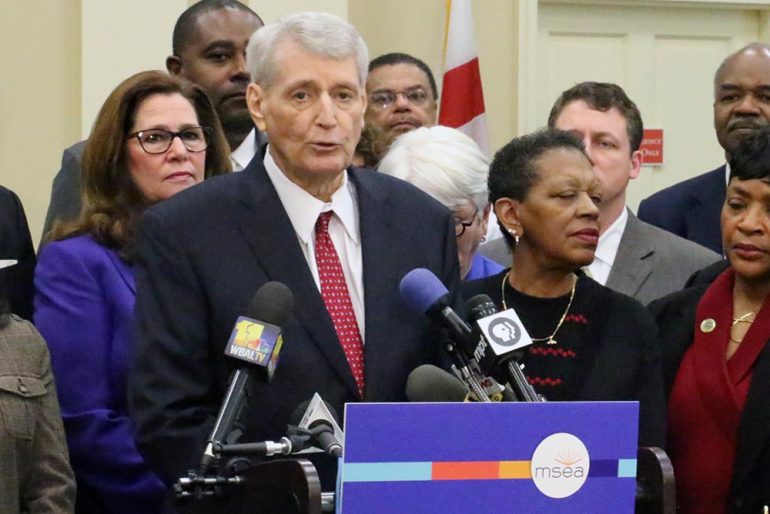ANNAPOLIS, Maryland – As the U.S. Senate voted to confirm Betsy DeVos as secretary of education, a group of Maryland lawmakers gathered in Annapolis Tuesday afternoon to introduce a package of five legislative priorities regarding education.
The lawmakers pledged to pass the Protect Our Schools Act; block Republican Gov. Larry Hogan’s Public Charter School Act; oppose the governor’s proposal to double funding for his Broadening Options and Opportunities for Students Today — or BOOST — Program; restore education funding that has been cut in the governor’s budget; and pass the Less Testing, More Learning Act.
Betty Weller, president of the Maryland State Education Association, announced the priorities Tuesday in front of a crowd of legislators in the House Office Building.
“We have a once-in-a-decade opportunity to change the direction of our schools, move away from standardized testing and focus on the things that we know work to help kids learn,” Delegate Eric Luedtke, D-Montgomery, told the University of Maryland’s Capital News Service.
Luedtke, the sponsor for the Protect Our Schools Act, said he plans to use the Every Student Succeeds Act — or ESSA, which was passed by Congress in 2015, as a way to overhaul the way schools are assessed in Maryland.
ESSA, the successor to No Child Left Behind, is the federal law that provides funding to public schools. The act allows states to evaluate schools’ performance using their own metrics, rather than solely through standardized testing.
His bill would lead to schools being evaluated not just on test scores but “things like the number of highly qualified teachers, access to AP courses, the things we really should be focused on,” Luedtke said.
Luedtke, who taught for Montgomery County Public Schools for 11 years, says that there are a number of states considering similar legislation, but there is no precedent for his Protect Our Schools Act.
Additionally, Luedtke’s bill prevents the state from “interfering in local school improvement plans” for the first four years and prevents the state Board of Education from using a number of privatization tactics, including vouchers and charter school conversions.
Legislation sponsored by Sen. Roger Manno, D-Montgomery, will require that at most an aggregate of 20 hours, or 2 percent, of the school year’s instructional hours, may be devoted to testing. The other 98 percent must be spent on teaching.
The legislative package comes as a response to the U.S. Senate’s confirmation of Education Secretary Betsy DeVos.
DeVos, who was confirmed Tuesday following Vice President Mike Pence’s tie-breaker vote after a rocky confirmation process, has been a strong advocate for a national voucher system.
Maryland Democrats said they would edit Hogan’s proposed budget and return funding for after-school and summer programs.
The lack of enrichment for students who cannot afford private summer programs leads to a “brain drain,” said Delegate Maggie McIntosh, D-Baltimore.
McIntosh, who had been an art teacher for Baltimore City Public Schools, is the chairwoman of the House Appropriations Committee, which is expected to amend Hogan’s proposed budget.
The last two priorities for Maryland Democrats are to block Hogan’s proposal to double BOOST’s funding and his Public Charter School Act, which would create a separate school board for charter schools.
“Baltimore has more charter schools than anybody in the state….It’s been problematic,” said Sen. Joan Carter Conway, D-Baltimore.
Although there is no federal voucher system, 25 states, including Maryland, and Washington, D.C., use some type of voucher program, with varying levels of success.
Maryland’s voucher system, the BOOST program, was created as part of last year’s budget by Hogan and allocates $5 million from public school funding to be used for private-school vouchers.
The governor and state legislators select the BOOST advisory board, which distributes and sets the value of the vouchers.
“The governor believes that all children, no matter where they grow up, deserve a chance at the best education possible,” said Hogan press secretary Shareese Churchill. “This administration will continue to be a strong advocate for all forms of education including traditional public, charter, non-public and innovative school options like P-TECH – which ultimately is in the best interest of our children.”
This school year just under 2,500 students participated in the BOOST program and the average value of each voucher was just under $2,000, according to EdChoice, a pro-voucher group.
Md. lawmakers announce anti-voucher proposals

